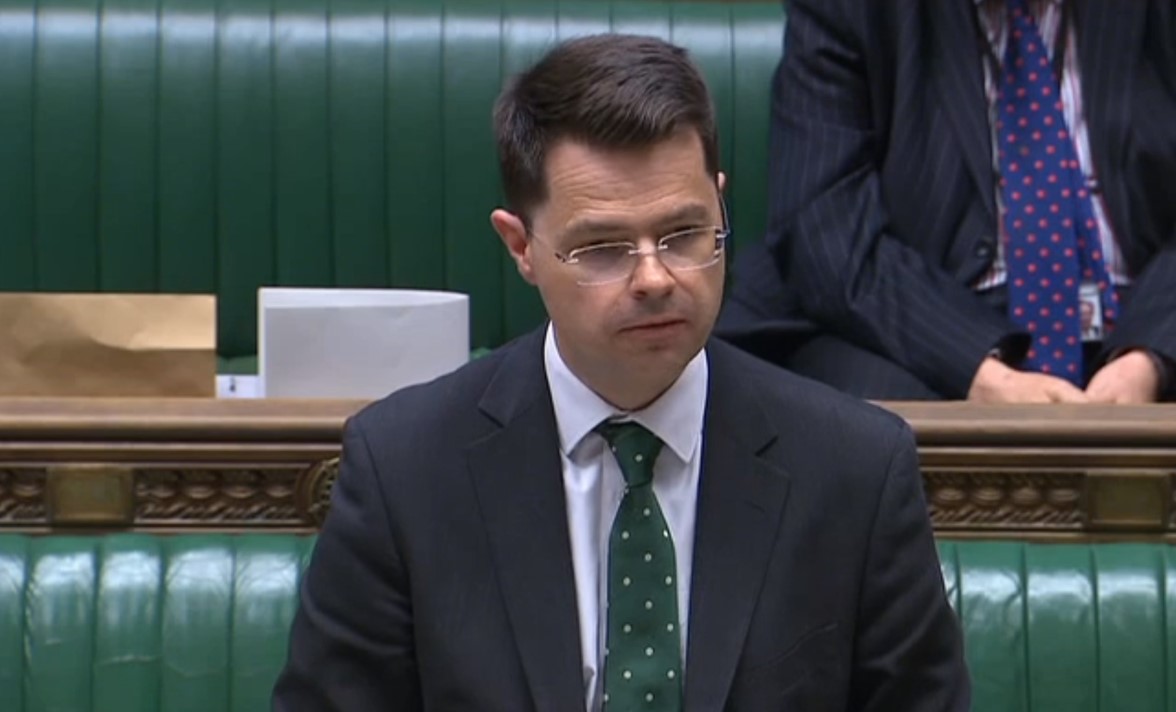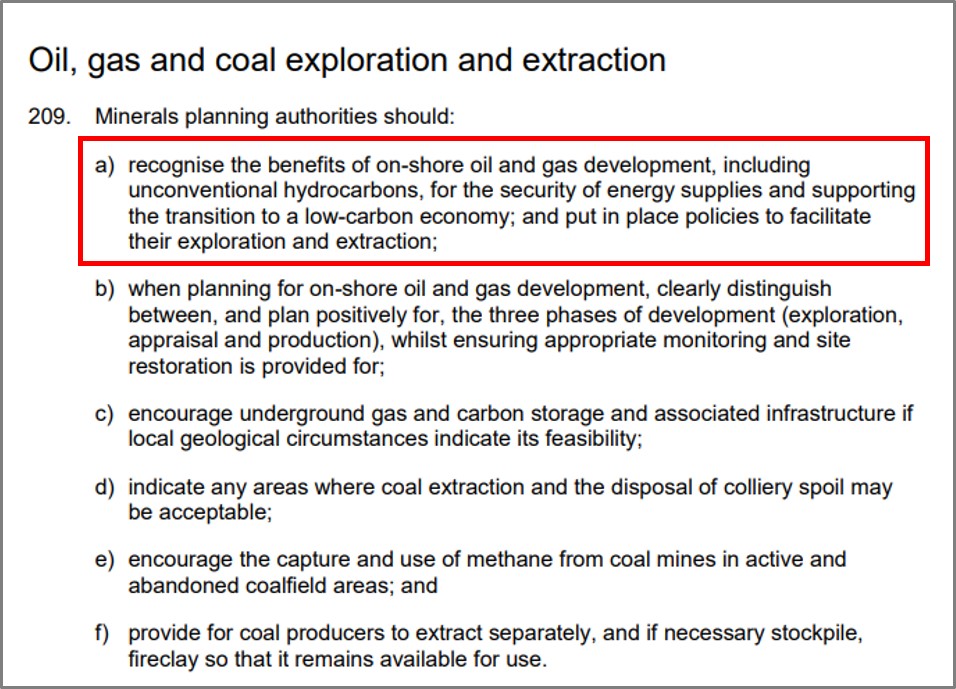
Local government secretary, James Brokenshire. Photo: Parliament TV
The government has made its first public comment on the legal challenge which quashed a key section of planning policy on shale gas and fracking.
In a short written ministerial statement, the local government secretary, James Brokenshire, responded to the High Court judgement in a case brought by a Lancashire campaigner.
Mr Justice Dove ruled in March that a paragraph of the National Planning Policy Framework (NPPF) on the benefits of shale gas was unlawful and should be removed.
Claire Stephenson, who brought the case, argued successfully that the government had failed to take account of comments on the policy made during a public consultation. She said a submission from the campaign group, Talk Fracking, challenged the government’s view of the impact of shale gas on climate change.

In the statement, issued yesterday (23 May 2019), Mr Brokenshire acknowledged that paragraph 209(a) of the NPPF had now been quashed.
This required local councils to recognise the benefits of onshore oil and gas developments for energy security and supporting the transition to a low-carbon economy. The paragraph also required councils to put in place policies to facilitate oil and gas exploration and extraction.
Mr Brokenshire said the government remained “committed to the safe and sustainable exploration and development of our onshore shale gas resources”.
He added:
“For the purposes of the National Planning Policy Framework, hydrocarbon development (including unconventional oil and gas) are considered to be a mineral resource. Specific policy on the planning considerations associated with their development is set out at paragraphs 203-205 and the remainder of 209 of the National Planning Policy Framework.
He drew attention to two remaining extracts of minerals policy in the NPPF:
- 204(a): planning policies should “provide for the extraction of mineral resources of local and national importance”
- 205: “When determining planning applications, great weight should be given to the benefits of mineral extraction, including to the economy”.
He also said written ministerial statements on shale gas and planning, made on 16 September 2015 and 17 May 2018, remained in force and unchanged. Planning practice guidance on minerals was also unaffected by the ruling, he said.
Mr Brokenshire added:
“This suite of policies and guidance remain material considerations in plan making and decision taking for hydrocarbon development and they should be afforded appropriate weighting as determined by the decision maker.”
Ms Stephenson said:
A significant paragraph of the National Planning Policy Framework (NPPF) is no longer legal or allowed to be used.
“This means that future planning applications for fracking will be able to be objected on current scientific evidence, specifically about climate change, and not constricted as before by government policy insisting ‘great weight’ should be placed on oil and gas extraction.
“Time and evidence has moved on and the government should now accept that fracking is dead: it has missed its window and that government support for dirty energy should be dropped. The future is in renewable and clean energy technology. It’s time the Conservatives joined the rest of political parties and oppose fracking.”
Steve Mason, of the campaign network, Frack Free United, said:
“The judge’s ruling means there is now more power for local authorities to take a position against shale gas exploration and fracking. It has opened up the debate on what is a sustainable mineral. Following the judgement, there has been a fundamental change in the perception on the contribution of onshore oil and gas in climate change and energy security.”
Last week, Mr Justice Dove ruled that the government did not have to carry out a new public consultation on its planning policy on fracking. He awarded costs against the government.
Categories: Environment, Politics

Great news
The extracts 204(a) and 205 both use the word “should”. They are therefore only guidelines and can consequently be ignored by councils if they so decide.
Malcolm Kenward
Section 1.1 of the National Planning Policy Framework uses ‘should’ to define the application of the policy as a whole. As such, I guess councils can ignore it in its entirety, if they so decide, based on that part alone.
You would be hard pressed to find a “shall” in the entire document.
Its quite obvious that the People who can afford to take the Government to court over the wording of their policy’s are not the same people who struggle to heat their homes due to the high energy costs brought about by the overblown campaign on climate change of which the entire UK accounts for Less than 1%
Could the anti-frackers please explain why in this ruling & the resultant decision of James Brokenshire to revoke 209a (if only this government would revoke Brexit instead, much more important at this monent than shale gas); why you are so pleased that a technology that can supplement our dwindling natural gas supply is now persecuted in mineral planning regs relative to coal? Indeed there is no VAT on coal, unlike gas. Please explain these inconsistencies. I am a scientist, & was a government advisor on energy for 9 years to the revolving door of energy ministers, for whom I gave some continuity. I warned them then that swapping evidence based policy, for politically correct decisions was a road to disaster, & nothing has changed my mind so far with respect to my evidence-based advice at that time. Please explain. I can’t. https://www.youtube.com/watch?v=gfuXblWUGOs
Nick, I’m not convinced that it’s worthwhile even trying to get a logical answer to your question. I attended a really good lecture last week by Iain Stewart on communicating science to the general public and the depressing conclusion is that it’s pretty much a waste of time trying to use scientific arguments and evidence to change the minds of the general public on these issues. They’re opinion is made up based on gut feelings and values – the only interest they ever have in science is to find articles that reinforce their own beliefs.
If anti-frackers can find scientific articles which reinforce their beliefs, why then reject such articles out of hand ? Differing scientific forms of analysis need to be assessed by claimed experts as part of the dialectics of debate.
Harry
Just to nit pick slightly. It would be scientific articles to support their assertions? Beliefs can be held without any scientific evidence to support them. Similarly so can opinions.
This is why, in my opinion, we can only discuss discrete facts on here. Once beliefs come up it just reverts to evil fossil fuel vs hypocrites using it and so forth rather than some specific fact or assertion.
Judith, Indeed. https://www.youtube.com/watch?v=mYajHZ4QUVM